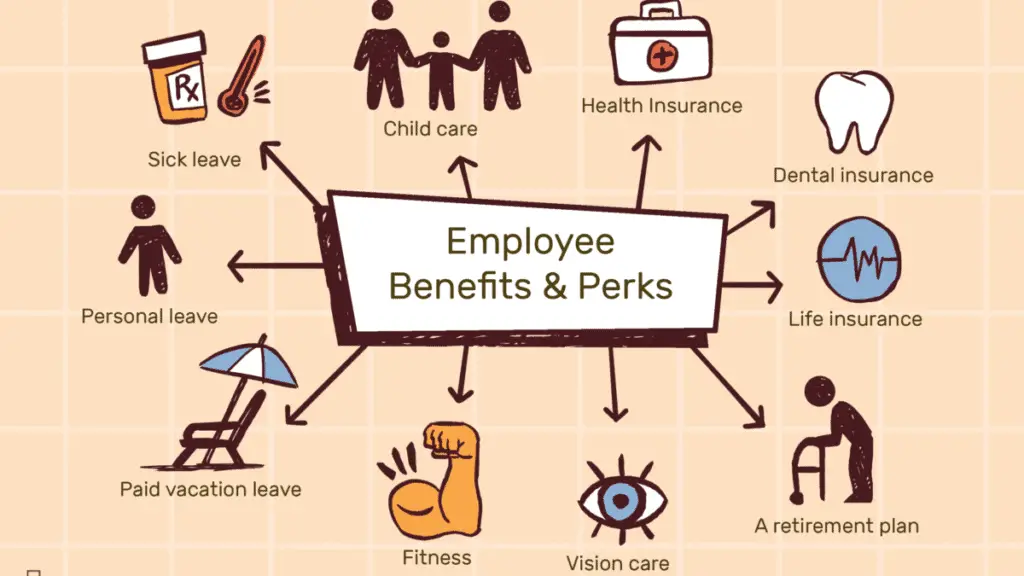Losing an employee is estimated to cost a company 1.5 – 2.0 times the employee’s salary depending on the seniority of the employee.
The common assumption is to simply pay employees more money to retain them. However, the are many other important factors involved, when it comes to keeping an employee engaged with an organization besides money.
In this article, I have listed the most important reasons next to money, for employees to stay at a company.

The order of the examples does not matter, because the importance of each vary from generation to generation, and from employee to employee.
It is on you to figure out which factors might appeal the most to your employees, and what specific strategies are needed for your case. Let’s dive in…
Additional benefits are helping to keep employees
Additional benefits are a smart way to encourage employees to stay with a company. Benefits are here to make working at company X more appealing besides the salary which you receive.

Why do companies do that, if you look from a psychological point of view getting a salary every week/month is nice and all, but the ability to for example to drive a nice car, don’t pay gas and not pay for the car itself, is immensely powerful.
It reminds employees of the fact that the company cares about the employee on an everyday bases.
Having for example a company car, that you use every day to go grocery shopping, is a nice benefit because it is much more tangible than receiving a paycheck at the end of the week/month, of which most of it disappears quite quickly.
Examples of additional benefits are for example stock awards of a company, flexible work hours, or even better the flexibility of working from home.
Being able to work with good computer equipment which you can use privately as well, free merchandise articles to wear, but also to hand out to friends (I have for example a dozen mugs from my employee laying around in my kitchen).
Healthcare benefits, being able to not worry about paying insane amounts of cash for basic check-ups.
Free food and drinks at the office, which encourages employees to simply stay at work since everything is there. One example I saw, which does this well was the Google office in Dublin, Ireland.

Despite having a chocolate fountain party every week in their basement, they have dentists, normal doctors, physiotherapists, and much more at their office to make the experience of hanging out at the office as easy and comfortable as possible.
My own company has a gym in the basement offering special classes to encourage employees to work out, which relieves stress and such. I for example love squeezing in a workout at around 2pm just when you feel the tiredness taking its toll. A quick workout helps me become more energized and clears my head to focus better on my tasks.
You see there are a lot of ways, to make an employee stay at a company using special benefits. One of my friends even changed her organization and went to a direct competitor because of her need for flexible work hours.
However, it is immensely important to understand what your high-performing employees want/need on top of their salaries, to reduce the risk of losing them eventually.
Salary has a big impact on employee retention

I don’t think that this comes as a surprise but providing a competitive salary can be an incredible driver for employee retention.
If your employees do not see their hard work compensated so they’re able to provide to their families or enjoying a night out, then this can have a huge impact on employee retention.
There are of course several different salary programs. Such as including bonuses based on performance, or completion of projects and such.
Soccer players are receiving huge bonuses whenever they score a hit for example. The same goes for the defended on a game whenever he/she can prevent an attacker from coming through.
Similar models could be applied to match the work culture, but also to keep employees engaged. Which, when they get valued fairly can impact a person’s decision heavily upon staying or leaving a company.
A colleague of mine recently changed the organization even though he loved his team, the company, and the job itself, but felt that for him at this stage of his life a 40% pay increase has a higher priority, or is simply an offer which he couldn’t refuse.
Being able to form social networks affects employee retention
While this might not be a clearly defined expectation, the ability to form social relationships is an immensely powerful tool to retain employees.
Let me give you an example. If you start university life, it is expected by society that you focus on learning and getting grades and such. However, another factor which is a crucial part of studying is the ability to make lifelong friends.
With whom you go through university life together, create some fun memories, and whom you can call whenever you want even after you’ve finished university life.
This is a hidden expectation that people have when entering an organization as well. People want to enjoy working there, they want to have the opportunity to form connections, and so on.

It is advised that the number one way to retain an employee, is to create an environment where colleagues become friends. This makes it so much harder to leave.
So, creating networking events, sending employees to off-site events and such are a way for your employees to form a deeper connection among their colleagues.
Having (actual) responsibilities impacts employee retention

Remember when you had to work on something just for the sake of working. You know sorting screws in school just to keep you busy during detention. Only for the overseeing teacher to put all the screws pack into the box for the next student to sort.
I really hope you didn’t have to go through something like this, I’ve heard it is annoying, boring and extremely painful, at least that’s what my friends said..*cough*..
Now when working at an organization the worst thing you can do is giving people work just for the sake of working.
Combine these unnecessary tasks with the new millennial workforce, who are don’t feel engaged when working on projects which lacks purpose, and/or have at least some impact. Then you might as well calculate an extra budget for hiring more employees since your turnover rate will be through the roof.
Employees need tasks which make them get up in the morning. They want tasks and responsibilities which matter and which create a sense of accomplishment when achieved.
If that is not a given, then there will be a problem when it comes to retaining your employees.
Training and education are important for retaining employees
Being trained and educated, to learn something new is crucial for some employees. If an employee is working on the same thing every single day for a long period of time, then he or she is just bound to leave as soon as something more invigorating/interesting comes along.
In my youth, I’ve worked in factories where I had to do one movement every single night for 7.5 hours. To this day this was the biggest personal driver for making a career.
Now while it is important for employees to be able to learn, a company needs to provide a culture and opportunities to actually learn something new.
A company could offer special training or workshops on specific skills, I’ve for example taken a design thinking training provided by my company and enjoyed this so much that I use it to this day at my work. Which of course helps the company as well.
However, providing growth opportunities isn’t enough, an employee also needs to be able to test new things, and fail on its path to mastery.
If a company offers, for example, room for learning and failing until you find the right solution, it can engage employees tremendously. This ties to our psychological need to express ourselves and fosters our creativity.
The company image effects employees staying
Imagine you’re at a party or at a bar, and you meet new people. I will bet you ten dollars right now that at some point they will ask the question: “Soo what do you do?”.
Now being able to say I work for NASA or Google, or Facebook projects a certain image. Not everyone makes it through the though hiring process of NASA for example.
Plus, these companies are well known across the globe and have a reputation to some extent.
So, a company brand and image can trickle down to the employee and impact how other people see them as well.
Job security can affect on employee retention
Being able to have a relatively secure job in uncertain times is an immensely beneficial factor for employee retention. Especially considering the millions of unfortunate people who’ve lost their job during events such as corona.
Uncertainty is an immensely powerful factor for employees to choose a job.
A mother of two might feel more compelled to stay at a job if the job provides a stable income and a guaranteed job for the next years as opposed to risking it all and going for a different job which might pay a little more but has a six month trial period in which she could simply be let go at any point in time.
Now factoring in a global pandemic which is devastating our economy just makes staying at a secure and stable job just much safer.
Company values are important for employee retention
This is quite an important factor for millennials. They especially need to feel that the company values align with their own.
Is a company for example focusing on reducing their carbon household or even tries to become carbon negative? Are the companies value to foster trust and always keep an open mind when interacting with other people or when faced with challenges.
How is the companies standpoint to the LGBT community are they open-minded about it. Is the company engaging in the local community, fostering the involvement of employees in social non-profit projects, and such?
The company I work for invites several non-profit organizations every year to give them completely free counseling on how we can help them. All because these factors matter to a number of employees.
These are just a couple of example of company values or consideration points which can help retain employees.
Having a long term perspective can affect employee retention

This is another, quite an important factor especially when it comes to young hires.
Being able to have a perspective within the company, multiple ways to develop, many different paths to take is a strong factor to keep employees within the organization.
Companies offer, especially to high-performers opportunities to grow with certain career coaching, involvement in shadow opportunities to see different roles, and much more.
The idea is to discuss early with the employee where he or she wants to go and how the company can help develop him or her to reach that position – preferably inside the organization.
Just Remember
That these retention factors can change depending on the generation and the individual. You might have a different weight on these factors than someone who has just started to work for example.
Which makes it important to have a thought about these factors and think which demographic and retention strategy makes the most sense for my employees.
